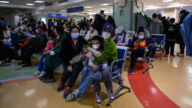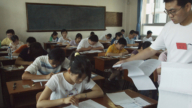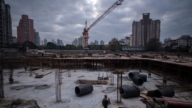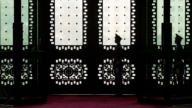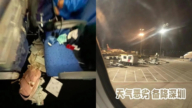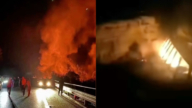【新唐人2012年4月26日訊】香港的英文報刊《南華早報》星期一在頭版報導說,中共中央工作組正在香港調查薄熙來和他太太谷開來,及其他親屬的巨額資產,並調查這些資產如何轉移到香港及海外。專家指出,不只薄氏家族,目前中國國內正有大批資金外逃。
香港媒體說,薄熙來和谷開來海外財產龐大,關係盤根錯節。
報導說,薄熙來的哥哥薄熙永使用「李學明」的化名,擔任香港上市公司「中國光大集團」執行董事兼副總經理。而《彭博社》也披露,谷開來的姐姐們掌控著價值1.26億美元的商業網,範圍從北京到香港,一直延伸到加勒比海。
財經專欄作家廖仕明指出,中共高官通過多種手段洗錢,通常香港只是一個中轉站。
廖仕明:「比如說用貿易的方式,用境外投資的方式,用境外金融投資的方式,也有一些以融資作為藉口。他的最終目地地可能是歐美的一些高度保密的信託公司。很可能都是進到那些地方去。」
廖仕明認為,只要在大陸掌握一定線索,可以順籐摸瓜在香港進行調查,但由於貪官洗錢方法既多又複雜,查起來很困難。
廖仕明:「最後那個投資,他可能根本就沒有花錢,或者只花了100萬的律師費,然後他就把這個項目給作廢了,那筆錢就留在那裏了。留在那個地方它並不是說就在當地的銀行,它可能就轉到瑞士去。這個在中國叫做『後路工程』,有一批專門的人去做這個所謂的『後路工程』。這裡面很複雜,現在發展出方式越來越多。所以查起來確實是很困難。但是,並不是說查不出來。」
薄熙來夫婦的海外資產,再次引發媒體關注中共高官將非法所得和家人親屬轉移海外。
據報導,「中國高鐵總設計師」張曙光的妻子在美國洛杉磯有3處豪宅,在美國和瑞士有28億美元存款。而鐵道部部長劉志軍在位期間,鐵道部系統在海外吃回扣、貪污工程款、倒賣火車票總額高達600億,其中和劉志軍家族有關的有120億。另外,原浙江省建設廳廳長楊秀珠,涉嫌貪污2.5億元人民幣,她在紐約黃金地帶至少買了5處高級房產。
廖仕明表示,貪官將非法所得資金轉移海外從80年代末就開始了,發展到現在,已經形成一套完整的外逃系統。目前,中國資本項順差和貿易項順差都大幅度減少,說明有一大筆資金正在往外跑。
根據他的調查,今年第一季度外資進入中國的項目是290多億美元,比去年減少了6%。而中國對外直接投資大約是160億美元,比去年增長超過94%,幾乎是翻了一倍。
廖仕明:「國外很多地方都是經濟不是很景氣的時候,哪有這麼多項目去投資?那個投資是直接投資,不是金融投資,不是買債券、買股票,它是直接投資,增長了一倍。這一倍我敢打包票的說,裡面大部分都是資金外流、外逃。這些中國政府知不知道?根本就是知道的,只不過就是涉及到各級的官員,已經變法不責眾了。」
廖仕明分析,貪官紛紛把資金轉移,說明對當前政局前景並不樂觀,而國內許多高官都有類似海伍德這樣的外國代理人,不僅幫助他們在政治和媒體上做宣傳,而且私下還負責資金的移動。
採訪/梁欣 編輯/尚燕 後製/肖顏
==============================
Huge Assets Flee from China
On Monday, Hong Kong’s English newspaper, South China
Morning Post, reported on its front page that
a Beijing task force had been sent to Hong Kong to investigate
assets reportedly belonging to Bo Xilai, his wife Gu Kailai, and their siblings.
The team will investigate how those assets were transferred
to Hong Kong and overseas.
The expert indicates that aside from the assets transferred
by the Bo’s, there are other huge assets leaving China via various channels.
Hong Kong media reported that Bo Xilai and Gu Kailai’s
overseas assets are enormous and there are intricate family ties.
The report said, “Bo Xiyong, Bo Xilai’s elder brother,
is apparently an executive director and
deputy general manager of Hong Kong-listed China Ever
bright International, under an assumed name,’Li Xueming.'"
Bloomberg also reported, “The sisters of Gu Kailai controlled
a web of businesses from Beijing to Hong Kong to the Caribbean worth at least $126 million."
Liao Shiming, an economy columnist, indicates that the Chinese
Communist senior officials launder money through various means;
Hong Kong is usually just a transit point.
Liao Shiming: “They could launder through trading,
overseas investments, offshore trade investments, or financing.
His ultimate goal could be a trust company of
high confidentiality in Europe or the United States.
That’s where the money could possibly go."
Liao Shiming believes that with certain clues in the mainland,
the investigation can be immediately conducted in Hong Kong.
However, with the numerous and complex methods the corrupt
officials employ to launder money, the investigation will be difficult.
Liao Shiming: “The investment on the project, could be made
no expense on the fund or perhaps one million dollars attorney’s fee.
With the abolishing of the project, the money is there to stay.
It won’t stay at a local bank, but somewhere in Switzerland.
This is called “posterior project" in China.
There are a group of experts in China conducting this
so-called “posterior project."
It is very complex, and highly developed. The investigation is
indeed very difficult, but, not completely impossible."
Bo Xilai’s huge assets abroad have once again brought media
attention to the illegal overseas assets of the CCP high officials and their family members.
There is report that the wife of the architect of the
Chinese high-speed rail, Zhang Shuguang,
owns three mansions in Los Angeles, and has a savings of
US $2.8 billion in the United States and Switzerland.
The Ministry of Railways collected a total of up to 60 billion
through overseas kickbacks, embezzlement of project funds,
and reselling train when Liu Zhijun was the Minister.
Liu Zhijun’s family owned 12 billion of the collected.
In addition, the former Zhejiang Provincial Construction
Department Director, Yang Xiuzhu, is suspected of
corruption of 2.5 billion yuan and had purchased at least
five luxury real estate properties in the heart of New York.
Liao Shiming says corrupt officials transferring illegally
acquired funds abroad can be dated back to the late 1980s.
To date, the laundering system is fully developed.
At present, China’s capital surplus and
trade surplus have been significantly reduced. This suggests a lot of money is going out.
According to his investigation, foreign investment in China
is over 29 billion U.S. dollars for the first quarter of this year, 6% less than last year.
China’s direct investment to foreign countries is about $16
billion, a more than 94% increase over last year, which is almost doubled.
Liao Shiming: “There are not many projects
to invest in during such a dull worldwide economy.
The investment to foreign country refers to direct investment.
It is not about financial investment, buying bonds or stocks.
It is direct investment that has doubled.
I dare to guarantee that the majority of it belongs
to the laundered money.
Does the Chinese government know?
Definitely, yes.
Since the officials at all levels are involved,
no one can be held accountable."
Liao Shiming analyses the fact the corrupt officials are all
transferring their assets indicates the current political outlook is bleak.
Many high-ranking officials hire foreign agents such as Neil
Heywood, who not only help them with political and media publicity, but also take care of the money laundering.


